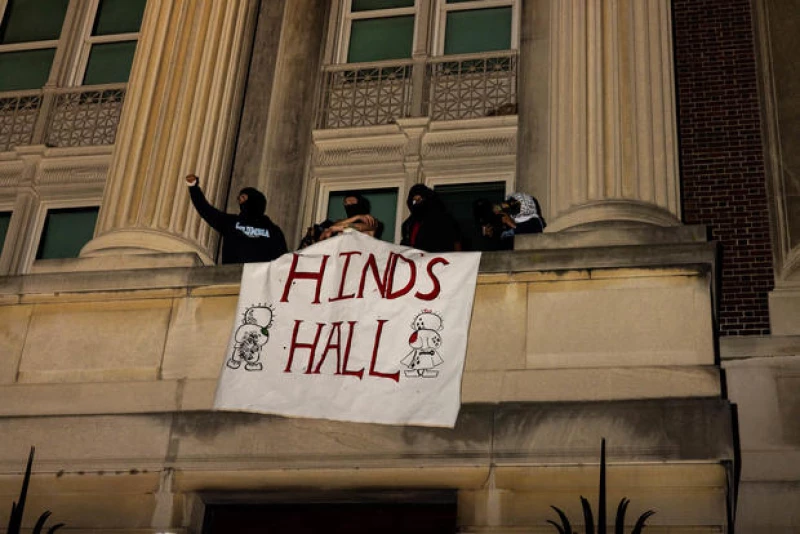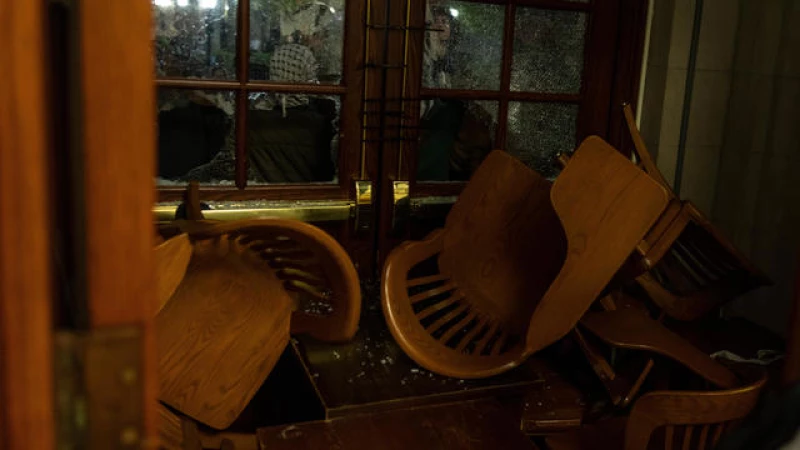During the early hours of Tuesday, a group of protesters seized control of a building at Columbia University in New York. They barricaded the entrances and displayed a Palestinian flag from a window, marking a new phase in the ongoing demonstrations against the Israel-Hamas conflict that have been seen on college campuses across the country.
Video footage captured the scene at Columbia's Manhattan campus as protesters locked arms in front of Hamilton Hall, moving furniture and metal barricades into the building. Hamilton Hall was previously occupied during a 1968 protest for civil rights and against the Vietnam War. Shortly after midnight, posts on an Instagram page for the protest organizers called for support to maintain the occupation at Hamilton Hall.
"An independent group has taken over Hind's Hall, formerly known as "Hamilton Hall," in memory of Hind Rajab, a young martyr killed by the Israeli state at the age of six," CU Apartheid Divest shared on X, previously known as Twitter, in the early hours of Tuesday.

The student radio station, WKCR-FM, provided live coverage of the events unfolding at the hall, which transpired almost 12 hours after the protesters were given a deadline of 2 p.m. on Monday to vacate an encampment consisting of approximately 120 tents or face suspension.
During the recent events at the X post, protestors made it clear they were not going to leave the hall until the university met the CUAD's three demands: divestment, financial transparency, and amnesty.
Speaking to CBS News, Columbia junior Jessica Schwalb described the situation on campus as "lawless. Utter anarchy." She mentioned how demonstrators at Hamilton Hall secured the building by using zip ties on door handles, breaking windows with hammers, and placing metal bike locks around the doors. They also used heavy black metal tables to barricade the doors and brought in furniture from inside the hall to further fortify their position.
Columbia issued an advisory overnight...
Looking at the Bigger Picture
Universities all over the United States are facing challenges on how to handle encampments as graduation ceremonies draw near. Some are engaging in negotiations while others are resorting to force and ultimatums, leading to clashes with law enforcement.
On Monday, dozens of individuals were taken into custody during protests at universities in Texas, Utah, and Virginia. Meanwhile, Columbia University announced the suspension of students just hours before the occupation of Hamilton Hall.
Protesters are in disagreement over the Israel-Hamas conflict and the rising death toll, with the total number of arrests at campuses nationwide nearing 1,000 as the academic year comes to a close. This wave of protests is compelling colleges to reevaluate their financial relationships with Israel and their stance on freedom of speech. Some Jewish students have expressed concerns that the demonstrations are bordering on antisemitism, leaving them apprehensive about being on campus.
The situation of the arrested students has become a focal point of the protests, with both students and an increasing number of faculty members calling for amnesty for the demonstrators. The key concern is whether these suspensions and legal records will have long-term implications for the students as they progress into adulthood.
Diverse Approaches by Educational Institutions
At the University of Texas at Austin, an attorney reported that at least 40 protesters were arrested on Monday. This marked an escalation at the 53,000-student campus in the capital of Texas, where over 50 demonstrators were detained the previous week.
Later Monday, a group of officers in riot gear at the University of Utah attempted to disband an encampment outside the university president's office that had been set up in the afternoon. Students were forcibly removed by police, with their hands and feet being dragged, and the poles supporting the tents snapped while those who resisted were zip-tied. Seventeen individuals were taken into custody. The university cited regulations against overnight camping on campus property and stated that the students had been warned multiple times to disperse before law enforcement intervention.
The demonstration in Texas and others in locations such as Canada and Europe stemmed from the initial protests at Columbia University that have persisted.
Despite the 2 p.m. deadline given to vacate the encampment on Monday, numerous protesters remained on site. A small number of counter-demonstrators displayed Israeli flags, with one individual holding a placard questioning the absence of anti-Hamas chants.
Although the university did not request police assistance to remove the protesters, school representative Ben Chang mentioned that suspensions had commenced without elaborating further. Organizers of the protest stated that they had not been informed of any suspensions as of Monday evening.
Columbia University's management of the demonstrations has also led to federal complaints.
A lawsuit filed on behalf of Jewish students asserts that Columbia violated their contract by failing to ensure a secure learning environment, despite established policies and assurances. The lawsuit also contests the shift away from in-person classes and seeks urgent legal action mandating Columbia to enhance security for the students.
Meanwhile, a legal organization representing pro-Palestinian students is urging the U.S. Department of Education's civil rights office to investigate Columbia's adherence to the Civil Rights Act of 1964 concerning the treatment of students.
A spokesperson for the university declined to provide a statement regarding the complaints.
In a unique development, Northwestern University has come to an agreement with the majority of protesters on its campus near Chicago. The agreement allows for peaceful demonstrations to continue until the end of spring classes on June 1. In return, the protesters have agreed to remove all tents except one designated for aid, and the demonstration area will be restricted to only students, faculty, and staff unless approved otherwise by the university.
Meanwhile, at the University of Southern California, organizers of a significant encampment met with university President Carol Folt for a 90-minute discussion on Monday. While Folt did not disclose specific details, she mentioned that she had listened to the concerns of the protesters and indicated that talks would resume on Tuesday.
On April 15, USC faced controversy when they decided not to allow the valedictorian, who had expressed support for Palestinians, to deliver the commencement speech due to unspecified security reasons. Subsequently, the university also cancelled the keynote address by alumnus and filmmaker Jon M. Chu, and chose not to confer any honorary degrees.
The aftermath of these events, along with protests at Columbia University, led to demonstrations and an encampment on the USC campus last week, resulting in the arrest of 90 individuals by police in riot gear. As a consequence, the university has called off its main graduation ceremony.
Elsewhere, university administrators have been working to salvage their commencement events, with some resorting to clearing encampments in recent days. In cases where these efforts have been unsuccessful, officials have issued warnings of disciplinary actions, including suspension and potential arrests.
Students Stand Firm at High-Profile Universities
Despite ongoing protests and standoffs at Harvard, the University of Pennsylvania, Yale, and other prestigious institutions, students remain resolute in their demands. At Virginia Commonwealth University, police in riot gear attempted to disperse a protest encampment late Monday, leading to clashes with demonstrators.







